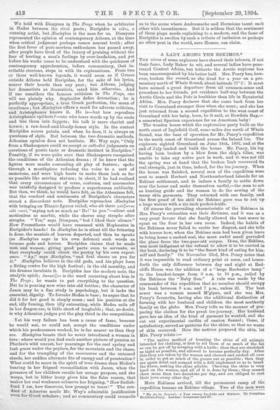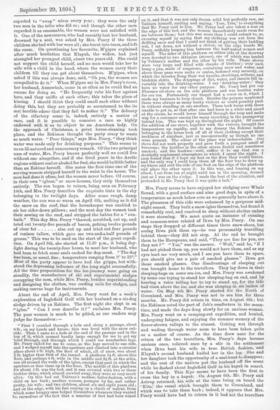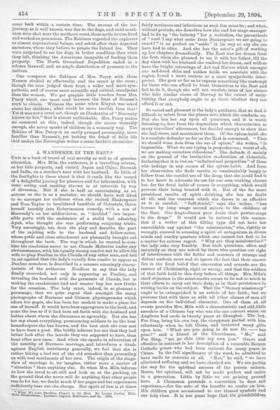A LADY AMONG THE ESKIMOS.*
THE wives of some explorers have shared their labours, if not their fame, Lady Baker to wit, and several ladies have pene-
trated Central Africa, but hitherto the Arctic explorer has been unaccompanied by his better half. Mrs. Peary has, how- ever, broken the record, as, she lived for a year on a pro- montory north of Whale Sound, about latitude 77°5. It must have seemed a great departure from all common-sense and precedent to her friends, yet residence half-way between the Arctic Circle and the Pole is healthier than life in Equatorial Africa. Mrs. Peary declares that she came back from her visit to Greenland stronger than when she went; and she has just returned from a second expedition to the west coast of Greenland with her baby, born, be it said, at Bowdoh3. Bay,— a somewhat Spartan experience for an American baby !
The wooden house which the exploration party built on the north coast of Inglefield Gulf, some miles due north of Whale Sound, was the base of operation for Mr. Peary's expedition to the north coast of Greenland across the Inland Ice. The explorers sighted Greenland on June 24th, 1892, and at the end of July lauded and built the house. Mr. Peary, his leg having been broken by a blow from the ship's tiller, was unable to take any active part in work, and it was not till the spring was at hand that the broken limb recovered its real strength, just in time, indeed, for the ice-journey. When the house was finished, several men of the expedition were sent to search Herbert and Northumberland Islands for an Eskimo settlement, and to induce a family to settle down near the house and make themselves useful,—the man to act as hunting guide and the woman to do the sewing of the many skin garments. They returned with one family, and the first proof of his skill the Eskimo gave was to cut up a huge walrus with a six-inch pocket-knife.
Of course the prevailing characteristic of the Eskimos in Mrs. Peary's estimation was their dirtiness, and it was as a very great favour that she finally allowed the best sewer to squat on the floor in her own room. Indeed, the habits of the Eskimos never failed to excite her disgust, and she tells
with horror how, when the Eskimo man had been given leave to bring home a cached seal, the most awful smell pervaded the place from the two-year-old corpse. Ikwa, the Eskimo, was most indignant at the refusal to allow it to be carried in the boat, declaring it to be "the finest kind of eating for him-
self and family." On November 23rd, Mrs. Peary notes that it was impossible to read ordinary print at noon, and hence- forth the only difference between day and night at Red- cliffe House was the addition of a "large Rochester lamp" to the bracket-lamps from 8 a.m. to 10 p.m., called by the Eskimos the "Baby Sun." A rule was made by the commander of the expedition that no member should occupy his bunk between 8 a.m. and 7 p.m., unless ill. The best sewer was a woman named M'gipeu, and she was Mrs. Peary's favourite, having also the additional distinction of forming with her husband and children the most northerly family on the globe. Mrs. Peary tells us the manner of pre- paring the clothes for the great ice-journey. Her husband gave her an idea of the kind of garment he wanted, and she cut oat experimental outfits of canton flannel; these, if satisfactory, served as patterns for the skins, so that no waste of skin occurred. How the natives prepared the skin, let Mrs. Peary relate :—
"The native method of treating the skins of all animals intended for clothing, is first to rid them of as much of the fat as can be got off. by scraping with a knife; then they are stretched as tight as possible, and allowed to become perfectly dry. After this they are taken by the women and chewed and sucked all over in order to get as much of the grease out as possible ; than they are again dried and scraped with a dull implement so as to break the fibres, making the skins pliable. Chewing the skins is very hard on the women, and all of it is done by them ; they cannot chew more than two deerskins per day, and are obliged to rest their jaws every other day."
More Eskimos arrived, till the permanent camp of the expedition became an Eskimo village. Two of the men were * My Ar. tic Journal : a Year among Roads and Eskimos. By Josephine Diebitseh.Peary. London : Longmuns and Co. reported to " swap " wives every year ; they were the only two men in the tribe who did so ; and though the other men regarded it as reasonable, the women were not satisfied with it. One of the newcomers, who had recently lost her husband, drowned by a seal, was asked by Mrs. Peary if the three children she had with her were all ; she burst into tears, and left the room. On questioning her favourite, M'gipsu explained after much hesitation that Klayuh, the widow, had just strangled her youngest child, about two years old. She could not support the child herself, and no man would take her to wife with a child in the hood, where the women carry their children till they can get about themselves. M'gipsu, when asked if this was always done, said, "Oh yes, the women are compelled to do it." When M'gipsu sat in Mrs. Peary's room, her husband, Annowkah, came in as often as he could find an excuse for doing so. "He frequently rubs his face against hers, and they sniffle at each other; this takes the place of kissing. I should think they could smell each other without doing this, but they are probably so accustomed to the (to me) terrible odour that they fail to notice it." The delicacy of the olfactory sense is, indeed, entirely a matter of race, and it is possible to conceive a race so highly endowed with it as to object to an American lady. On the approach of Christmas, a great house-cleaning took place, and the Eskimos thought the party crazy to waste so much water. "Poor things," says Mrs. Peary, "they think water was made only for drinking purposes." This seems to us an ill-natured and unnecessary remark. Of the two principal uses of water, Mrs. Peary knows perfectly well we could live without one altogether, and if she lived years in the Arctic regions without coal or alcohol for fuel, she would be little better than an Eskimo herself. She notes the first time one of the serving women stripped herself to the waist in the house. The men had done it often, but the women never before. Of course, in their own "igloos," or snow-houses, they strip themselves entirely. The sun began to return, being seen on February 14th, and Mrs. Peary describes the exquisite tints in the sky belonging to the twilight days. After some rough, damp weather, the sun was so warm on April 6th, melting as it did the snow on the roof, that the housekeeper was enabled to air her eider-down pillows ; and the next day the women took their sewing on the roof, and stripped the babies for a " sun- bath." This day Mrs. Peary "thawed, scrubbed, cut up, and tried out twenty-five pounds of bacon, getting twelve pounds of clear fat also cut up and tried out four pounds of venison tallow, which gave me two-and-a-half pounds of grease." This was to be used on the start of the great expedi- tion. On April 9th, she started at 11.30 p.m., it being day- light during the twenty-four hours, to meet her husband, who had been to fetch some seals cached for dog-meat. "The day has been, as usual, fine ; temperature ranging from 9° to 22°." Most of the party appear to have had the grippe, but with- stood the depressing influence of the long night successfully. All the time preparations for the ice-journey were going on steadily, the manufacture of ski and experimental sledges occupying the men, while Mrs. Peary, besides superintending and designing the clothes, was cording sails for sledges, and making canvas bags for instruments.
About the end of April, Mrs. Peary went for a week's exploration of Inglefield Gulf with her husband on a six-dog sledge driven by an Eskimo. The first night she slept in an ." igloo." "Can I ever describe it F" exclaims Mrs. Peary. The poor woman is much to be pitied, as our readers may judge for themselves :— " First I crawled through a hole and along a passage, about
• 0 ft., on my hands and knees ; this was level with the snow out- side. Then I came to a hole at the end of the passage and in the top of it, which seemed hardly large enough for me to get my head through, and through which I could see numberless legs. Mr. Peary called for me to come, so the legs moved to one side, and I wedged myself into the aperture and climbed into a circular place about 5 ft. high, the floor of which, all of snow, was about 2 ft. higher than that of the tunnel. A platform 14 ft. above this floor, and perhaps 4 ft. wide in the middle and 24 ft. at the sides, ran all around the walls of the igloo, except that part in which the aperture or door came up in the floor. The middle of this platform for about 5 ft. was the bed, and it was covered with two or three tooktoo skins, which almost crawled away, they were so very much alive. On this bed sat Tahtara's mother, tailor-fashion, with a child on her back; another woman, younger by far, and rather pretty, his wife ; and two children, about six and eight years old ; and on the edge, with his feet resting on a chunk of walrus, from which some hungry ones helped themselves whenever they wanted to, refrardless of the fact that a number of feet had been wiped on it, and that it was not only frozen solid but perfectly raw, sat Tahtara himself, smiling and saying, Yess, Yess,' to everything that Mr. Peary said to him. Mr. Peary had also taken a seat on
the edge of this bed, and the women immediately made room for me between them ; but this was more than I could submit to, so,
excusing myself by saying that my clothing was wet from the
drifting snow and that I could not think of getting their bedding wet, I sat down, not without a shiver, on the edge beside Mr. Peary, selfishly keeping him between the half-naked women and myself. The sides of this platform on either side of the doorway were devoted to two ikkimers (stoves), one of which was tended. by Tahtara's mother and the other by his wife. These stoves were very large and filled with chunks of blubber ; over each hung a pan, made of soapstone, containing snow and water, and above these pans were racks or crates, fastened very securely, on which the inmates flung their wet km:elks, stockings, mittens, and birdskin shirts. The di ippings of dirt, water, and insects fell in- variably into the drinking-water. I say 'drinking-Water;' they have no water for any other purpose. Mr. Peary had put our Florence oil-stove on the side platform and was heating water for our tea. Fortunately our teapot had a cover on it, which I made my business to keep closed. Besides the persons mentioned there wore always as many husky visitors as could possibly pack in without standing on one another. These took turns with those unable to got in, so that after one had been in a while and gazed at the circus, he would lower himself through the trap and make way for a successor among the many crouching in the passageway behind him. This was kept up throughout the night. Of course the addition of our stove, together with the visitors, brought the temperature up rapidly, and to my dismay the Eskimo ladies belonging to the house took off all of their clothing except their necklaces of sinishaw, just as unconcernedly as though no one were present. The odour of the place was indescribable. Our stove did not work properly and gave forth a pungent smell of kerosene ; the blubber in the other stoves fizzled and sometimes smoked; and the huskies—well, suffice it to say that was a decidedly unpleasant atmosphere in which I spent the night. I soon found that if I kept my feet on the floor they would freeze, and the only way I could keep them off the floor was to draw up my knees and rest the side of one foot on the edge of the platform and place tho other upon it. In this way, and leaning on my elbow, I sat from ten at night until ten in the morning, dressed just as I was on the s'edge. I made the best of the situation, and pretended to Mr. Peary that it was quite a lark."
Mrs. Peary seems to have enjoyed her sledging over Whale Sound, with a good surface and nine good dogs, in spite of a temperature as much below zero as we generally have above it. The pleasures of this ride were enhanced by a gorgeous mid- night sunset. They built a snow-igloo themselves, but found it remarkably cool, and resolved to sleep without shelter unless it were storming. We must quote an instance of cunning and common-sense related of Ikwa by Mrs. Peary. On one stage they dropped at different times three snow-shoes, but seeing Ikwa pick them up—he was presumably travelling behind them—they did not stop. At the end he brought them to the Europeans, and said, "They are fine for you, are they not F" "Yes," was the answer. "Well," said he, "if I had not picked them up, you would not have them, and as my eyes hurt me very much, and I see you have them to spare, you should give me a pair of smoked glasses." Ikwa got those smoked glasses. One disadvantage of sleeping out was brought home to the travellers. They lay down in their sleeping-bags on some sea-ice, and Mrs. Peary was awakened by some one trying to stand her sleeping-bag on end, and by hearing a voice telling her to try to stand up, for the tide had risen above the ioe, and she was sleeping in six inches of water. On May 4th Mr. Peary started for the North of Greenland, and Mrs. Peary was not to see him for three months. Mr. Peary did return in time, on August 6th ; but the Eskimos acted the part of Job's comforters in the mean- time, and made the days drag slowly for an anxious woman. Mrs. Peary went on a camping-out expedition, and hunted, undergoing fatigue, and enjoying the summer scenery of the flower-strewn valleys to the utmost. Getting wet through and wading through water seem to have been taken quite as a matter of course. As the time drew near for the return of the two travellers, Mrs. Peary's days became anxious ones, relieved once by a stir in the settlement when Ikwa beat his wife in true British fashion, and Klayuh's second husband knifed her in the leg. She and her daughter took the opportunity of a seal-hunt to disappear, and the rest of the natives put the husband off the scent while he dashed about Inglefield Gulf in his kayak in search of his family. This Kyo seems to have been the first to cross the bay in a kayak. On August 6th, Mr. Peary and Astrup returned, his wife at the time being on board the Kite,' the vessel which brought them to Greenland, and which was to take them back ; indeed, it appears that Mrs. Peary would have had to return in it had not the travellers
come back within a certain time. The success of the ice- journey, as is well known, was due to the dogs, and until musk- oxen were shot near the northern coast, these noble brutes lived and worked on pemmican. The Eskimos regarded the explorers as almost supernatural beings, and asked after their departed ancestors, whom they believe to people the Inland Ice. They were surprised to see the dogs in better condition than when they left, thinking the Americans incapable of feeding them properly. The North Greenland Expedition ended in a solemn farewell, and an ample distribution of presents to the natives.
One compares the Eskimos of Mrs. Peary with those Nansen studied so effectually, and the result 41 the same ; though the man judged them from a wider and more sym- pathetic, and of course more scientific and critical, standpoint than the woman. We get graphic little touches from Mrs. Peary which one must read between the lines of Nausea's work to obtain. Witness the scene when Klayuh was asked about her children ; what could be more terrible than that! Yet it was not a cruel act, though an illustration of "Necessity knows no law," that is almost unthinkable. Mrs. Peary makes no comment on this ; indeed, though she seems womanly enough, she never speaks of children in a womanly way, The Eskimo of Mrs. Peary is an easily grasped personality, more familiar than Nansen's, yet lacking the detail of daily life that makes the Norwegian writer a more faithful chronicler.








































 Previous page
Previous page